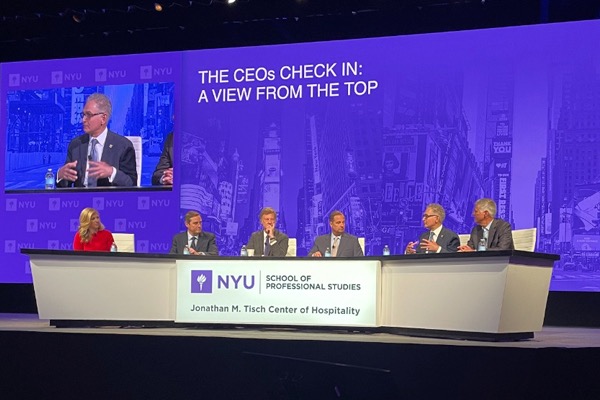The near-term future for hotel performance looks bright and the mood was upbeat as the industry’s leading CEOs took the stage at the opening session of the 44th annual NYU International Hospitality Industry Investment Conference at the Marriott Marquis in New York City.
Even with a potential recession in the U.S. looming, the CEO unanimously agreed RevPAR growth will continue for the next year or two. The question at hand is how deep the recession could be and will the wider economy witness a much-needed soft landing.

Naturally, the CEOs, including Marriott International’s Tony Capuano, Hilton’s Chris Nassetta, Hyatt Hotel Corp.’s Mark Hoplamazian, Accor’s Sebastien Bazin and IHG’s Keith Barr, said they are facing a battle to fight inflationary cost pressures, maintain service levels with reduced staffing and satisfy GOP requirements for owners. Meanwhile, they continue to see great recovery in leisure business and are starting to see improving business transient and group business.
Even business in Europe is brighter, suggested Accor’s Bazin, with rates reaching levels higher than those seen at peaks in 2019. “We are expecting a great summer, but many hotels cannot accept full occupancies as they struggle on the personnel and labor side,” he said. “It’s a tragedy we can’t get more people back… Yes, let’s smile more, but only if we can get more people back [to work in our hotels].”
The elephant in the room is the lack of outbound business from greater China, suggested Barr. “I don’t expect China’s borders to open until spring next year,” he said. “China can support its economy domestically, but it will be so much better when borders open.”
Hilton’s Nassetta brought up the dreaded “r” word, suggesting owners and operators manage more thoughtfully and prepare for a potential recession. ”But, business is very strong now and I think it is sustainable because of the massive amount of pent-up demand,” he said. “So many trip occasions didn’t get filled during the pandemic.”
Nassetta also suggested business travel, which used to account for 70% of Hilton’s business pre-COVID, is starting to return with the leisure-to-business ratio starting to return to equilibrium. “It’s starting to flip back toward business and it should rebound over the next few years – even in the face of reduced economic growth.”
Capuano said the industry and Marriott will continue to see occupancy and rate growth through at least the end of this year. “Guests are willing to pay, but it comes with expectations of service delivery – and that is the challenge,” he said.
All the CEOs say staffing levels are down with Barr suggesting it is down 20% from optimal levels.
Even increased wages, which Hoplamazian suggested are up 20%, there are more challenges to overcome staffing challenges. He said more flexible and dynamic scheduling is one of the keys to recruiting and retaining staff, as are improvement in immigration laws to back bring more traditional sources.
“Staffing is still an issue,” Nassetta said, “but it is not quite as severe. It will take more time to sort out all the issues – another couple of years. It won’t be easy, but it will be normalized.”
In opening remarks for the conference, Jonathan Tisch, chairman and CEO of Loews Hotels & Co, called on travel and hospitality leaders to position travel as both an economic driver and an essential component of a healthy, functioning society in a post-pandemic world.
“Travel is essential to the way we work and live—because it has tremendous potential to connect us—to each other, to ideas, and to opportunity,” Tisch said. “It brings people together, broadens perspectives, and spurs innovation and progress.”
Tisch stressed that, at a time when people and organizations are scrutinizing their budgets, the hospitality industry must demonstrate that travel has value beyond the economic.
Tisch first described travel’s ability to connect people. He enumerated the challenges facing society in the wake of the pandemic, including division and loneliness, casting travel as an antidote to isolation. He stated, “At a time of division, polarization, and anxiety, we have to remind decision-makers that travel is not a distraction from society’s most pressing problems—it’s a solution to them.”
He went on to explain how travel can connect people to ideas. As business travel has yet to fully recover and workers quickly tire of their home offices, he urged leaders to embrace an emerging reality.
“The lines between work, travel, and leisure have permanently blurred,” he said. “Workers who don’t have an office or a water cooler anymore can find one in Miami, or Philadelphia, or Asheville… that presents a unique chance for us as an industry to reimagine our offerings, to make them attractive to every kind of business traveler.”

